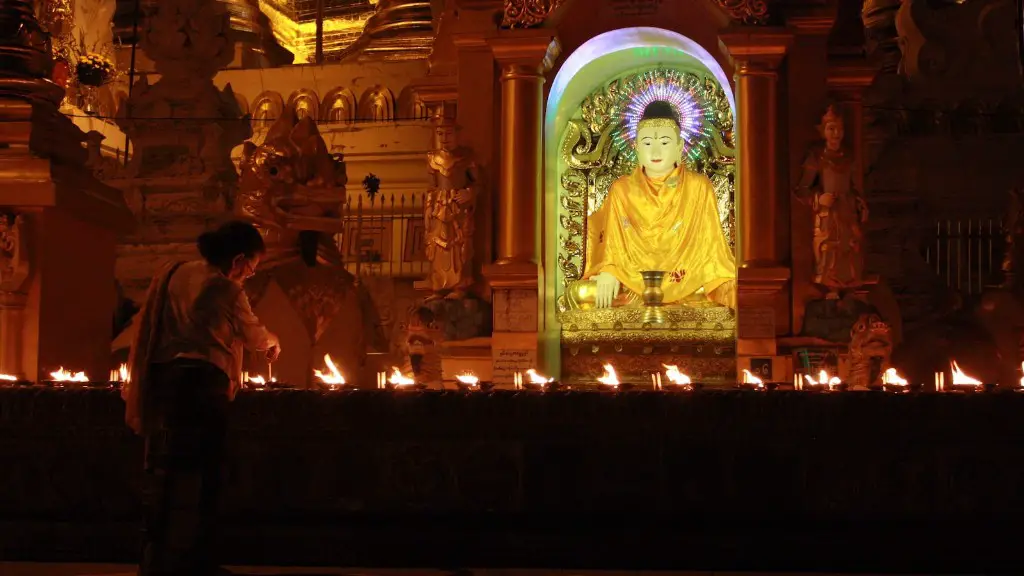Hinduism is one of the world’s oldest and most influential religions. It is distinguished from other major spiritual traditions by its diverse approaches to faith and its wide geographic dispersal. At its core, Hinduism is a conglomeration of various religious beliefs and practices that developed in India over thousands of years. As with many religious traditions, Hinduism has evolved over time and has been impacted by its interactions with other religions. It is interesting to note the specific similarities and differences between Hinduism and other religions. This article will explore the similarities between Hinduism and other religious traditions.
Hinduism places a strong emphasis on the veneration of nature. This practice is shared with humanity’s most ancient religious systems, such as animism and shamanism. For Hindus, nature is a fundamental element of spiritual life and its sacredness is expressed through certain ceremonies and rituals.
Hindus also recognize the power of karma, the idea that a person’s actions in this life will have an effect on one’s future lives. This belief is shared by Buddhism, Jainism, and Sikhism, which all stem from the Dharmic religions of India.
In terms of metaphysics, Hinduism and other religions also have shared beliefs. For example, Hindus share the belief in ultimate reality or God with Christianity, Islam, Jainism, and Sikhism. The ultimate reality expressed by these religions is usually seen as a powerful and compassionate divine energy that is omnipresent, eternal, and infinite.
Additionally, Hinduism recognizes the transformational power of prayer and meditation. This practice is again shared with many of the major religious traditions, such as Buddhism and Christianity. Prayer and meditation provide a spiritual bridge between the seeker and the divine.
Finally, it is important to note that while Hinduism has certain similarities to other religious traditions, it is also distinct in certain ways. For example, Hinduism is traditionally polytheistic, meaning that deities are seen and worshiped as individual entities. This aspect of Hinduism is quite distinct from the monotheistic traditions of Judaism, Christianity, and Islam.
Hinduism and Texts
The religious texts of Hinduism have been of great influence, not only within the Hindu faith but also in other religions. Then Upanishads and Bhagavad Gita are two of Hinduism’s most important texts, both of which have been interpreted and reinterpreted by later religions such as Buddhism and Jainism.
The Vedas, which consist of four primary collections of sacred hymns, are also revered by Hindus. These texts are seen as important tools for exploring the ultimate reality of Brahman, the all-permeating divine energy that is seen as the source of all existence.
Finally, the iconic holy book, the Bhagavad Gita is shared by Hindus, Jains, and Sikh. The Bhagavad Gita is considered an essential guide to the moral and spiritual life, and its teachings and stories have had a profound effect on Indian culture.
Hinduism and Other Religions
Hinduism has made its mark on many of the world’s major belief systems. For example, it has influenced theological concepts in Christianity, such as the trinity and the concept of ahimsa (non-violence).
The Hindu concepts of dharma and karma have also had an impact on Buddhism and Jainism. Dharma is understood to be an individual’s duty or purpose in life and karma is the notion that our actions have an effect on our future lives.
Hinduism has even had an influence on Zoroastrianism. The 6th century Persian prophet, Zarathustra, drew inspiration for his formula of good words, good thoughts, and good deeds from the ancient Upanishads.
Finally, Hinduism has impacted Islamic and Jewish thought in many ways. For example, the Sufi saint, Rabia al-Basri, was said to have been inspired by the Vedanta philosophy, while Arab polymaths explored Hindu philosophical theories and notions of reincarnation.
Hinduism and Science
Hinduism has often been at the forefront of scientific inquiry and experimentation. Many of its core concepts, such as karma and dharma, have been explored and developed through a rigorous process of scientific inquiry. This process has resulted in a number of fascinating and profound philosophical insights.
For example, the theory of karma has been explored in terms of cause and effect. This theory has been used to explain why certain events occur in a certain order, and why certain people are affected by certain events. In this way, karma has been used to understand and explain the workings of the universe.
Additionally, certain Hindu schools of thought, such as Advaita Vedanta and Samkhya, are rooted in the ancient practice of yoga. This practice has been explored and developed by science, resulting in a number of discoveries related to human consciousness and physical health.
Hinduism and Society
Hinduism has had an influence on Indian society since the Vedic age. For example, its spiritual precepts, such as ahimsa, have had an impact on the development of a non-violent culture in India. Hindu concepts such as karma, dharma, and rebirth are also deeply embedded in Indian culture.
Hinduism’s spiritual ideas have also had an impact on India’s other religions, such as Sikhism and Jainism. For example, many of Sikhism’s religious beliefs and practices originate from the Vedic tradition, while Jainism shares much of Hinduism’s beliefs in karma, samsara, and liberation.
Finally, Hinduism’s spiritual and philosophical teachings have had a global impact. Its belief that all life and existence are ultimately interconnected has inspired many spiritual and environmental movements around the world. In this way, Hinduism continues to spread its message of oneness and liberation.
Hinduism and Poetry
Hinduism’s influence can also be seen in its long and rich literary tradition. The ancient texts known as the Upanishads contain the foundational teachings and wisdom of Hinduism and have been studied for centuries. Additionally, the Vedic hymns contain beautiful, poetic language that speaks to the depth of the Hindu spiritual experience.
Poetry and literature have also been an important aspect of Hindu devotional practice, allowing worshippers to explore the divine through words and metaphor. For example, the devotional poems known as the Bhakti, or Bhagavad Gita, contain beautiful and powerful verses that have been passed down through generations.
Hinduism has also had a profound influence on other religious traditions, such as Buddhism and Jainism. The Buddhist scriptures, known as the Sutras, contain large sections that are influenced by Hindu literature. Additionally, the Jain texts, such as the Acaranga Sutra, are deeply rooted in Hindu teachings and ideals.
Hinduism and Music
Music has also played an important role in the Hindu spiritual tradition. The Vedic hymns, known as the Sama Veda, are beautifully composed songs that have been used for centuries in Hindu devotional rituals. Additionally, the devotional poetry known as the Bhakti, or Bhagavad Gita, often take the form of lyrical songs with simple melodies.
Hindu music has also had an influence on other religious traditions, such as Buddhism and Jainism. In Buddhism, the chanting of mantras and sutras is an important part of devotional practice. Similarly, Jainism has its own devotional songs and lyrics, which are largely derived from the Hindu tradition.
Finally, Hindu music has also had a major influence on modern-day music. One example of this phenomenon is the rising popularity of Indian Classical Music (ICM) in the West. This style of music, which is heavily influenced by Hindu devotional songs, has been embraced by many people around the world.


